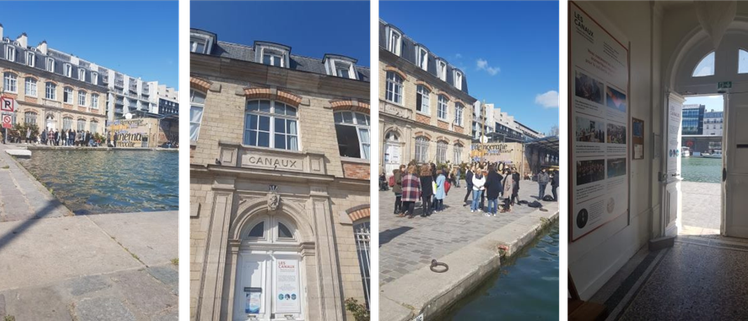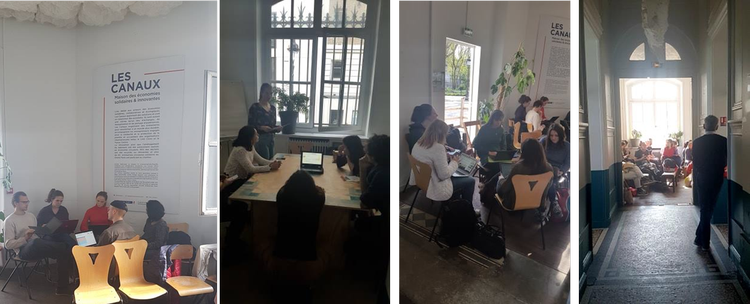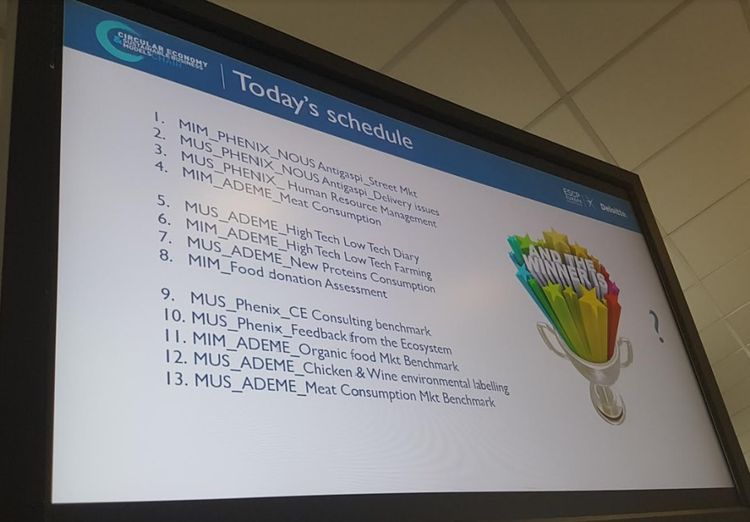Circular economy cannot be learned only at school.
Professors Valentina Carbone and Aurélien Acquier are convinced of this. They explain it in this video.
Involving companies and institutional actors, developing interdisciplinarity, and encouraging a reflexive posture by opening innovation spaces for students... are the 3 pedagogical principles of teaching circular economics at ESCP.
In 2015, ESCP created a specialisation called "Re-Think - social innovation, alternative business models and sustainability" in the Master in Management programme. In this specialisation, the 30-hour course "Circular Economy: towards sustainable business models" is followed by 30 students of the Master in Management, and by 45 students of the Master of Science in International Sustainability. "It is necessary to change our analytical tools and to look afresh at companies, as political players in our society," says Professor Aurélien Acquier, Head of Sustainability Transition and Scientific Co-Director of the Circular Economy Chair. "We generally start from examples of voluntary commitment by manufacturers and start-ups, to reflect on the role of companies that choose to get involved in actions, in the pursuit of objectives that go beyond mere profit."
It is not by chance that the Chair decided to hold one of its "Circular Economy" classes at Les Canaux, on Tuesday 26th March.

Located on the banks of the Canal de l'Ourcq near the Stalingrad metro station, the Maison des Canaux is a magnificent late 19th century building, renovated and entirely fitted out with upcycled waste material. Since its inauguration in November 2017, it has supported innovative actors of the social and the fair trade economy. The association initiates, organizes and hosts numerous programmes and events that aim to support, train and inform all entrepreneurs committed to a more inclusive, equitable and sustainable world.
On Tuesday, 26 March, about 70 students had the chance to discover this place dedicated to exchange and to the pooling and sharing of experiences.

At ESCP, the role of the Circular Economy in education is increasing. Professor Valentina Carbone is delighted about this: "In addition to the students in the MIM 'Re-Think' Specialisation, there are also students who follow the CSR and ethics modules in each of the federal programmes in different fields (law, accounting, finance, marketing,...), students on the Berlin campus in the MIM 'Sustainable Development' specialisation, and students on the Madrid campus in the 'Social Entrepreneurship' track. A Specialised Master in International Sustainability Management, taking place on the Berlin and Paris Campuses, was launched in 2016 and welcomes 44 students this year. Modules on 'Green Finance' and the circular economy have been introduced in the EMBA curriculum. Last but not least, the new Specialised Master in Entrepreneurship and Sustainable Innovation was launched in 2018 in Berlin, and opened to 25 students for its first edition. Without neglecting the logics of market forces and competition, our students are thus stimulated to reinvent more environmentally friendly business models."
On April 2, students were gathered for the final stage of the course, dedicated to group presentations.
In January, they were organised into 13 groups of 5 to 6 students and had to work on projects and tackle real business challenges for Ademe and Phenix.

Managing projects of this size in such a short period of time (only 3 months!) is a big challenge.
"This is a very interesting exercise, both academic and business oriented", say Aurélien Acquier and Valentina Carbone. "The project process supports the programme's learning objectives, encouraging students to apply knowledge of business and management to complex issues and situations. It also enhances skills such as identifying limits and constraints of traditional linear models."
The oral defense marks the high point of the project: only 7 minutes are allowed for a pitch followed by a Q&A session with the Jury and the whole class.
Meat consumption changing patterns, environmental labelling strategies, alternative protein consumption trends, high tech vs low tech farming practices, among many other topics, were at the heart of the debate.
Students provided the Jury with powerful new insights, with very interesting comparative worldwide analyses based on external data obtained by original surveys they designed and carried out…
Aurélien Acquier and Valentina Carbone warmly thank Vincent Colomb (Environmental assessment and eco-design engineer - Food chains, ADEME) and Pierre Lebrun (Head of Research & Consulting Department, Phenix), who entrusted the students with a 3-month consulting assignment and who took part in the Jury.
They also thank Jury member Philippe Kuch, Manager at Circular Economy Chair corporate partner Deloitte. "This student work was very amazing, and it was very interesting to be part of the jury. I think that these projects are needed to develop Circular Economy among students and companies," says Philippe Kuch.
Students did a really great job and the Jury had a very difficult task selecting the best 3.

And the winners are:
The "Phenix Prize" went to the project: Human Resource Management – congratulations to Camille Marichy-Barbara, Annemarie Dieckmann, Alix Ditisheim, Aurore Hernandez, Andrea Kostrowski and Alexandre Schnéegans. The Jury welcomed the way students were able to tackle a critical issue for a growing start-up exploring new territories of HRM practices.
The "Ademe Prize" went to the project: Organic food market benchmark – congratulations to Meryam Ziani, Julia Le Moullec, Laura Mangold, Lucas Huber, Marie Dutzer, Marco Cravetto. The Jury appreciated how the group managed to address all the topics of the course: European perspective, North/South issues, global value chain, distance between producer and consumer…
And the Jury's "Coup de Coeur" prize went to the project: New protein consumption for the new trends in nutrition and the rise of new markets. Congratulations to Emilie Grytte Eikeland, Jean Seyll, Hanne Lygren, Federica Ammenti, Elodie Schott, and Hauke Dahl. Students were praised for their ability to rely both on secondary data and on a successful survey, and for the "insect-testing" experience they organized.
Campuses